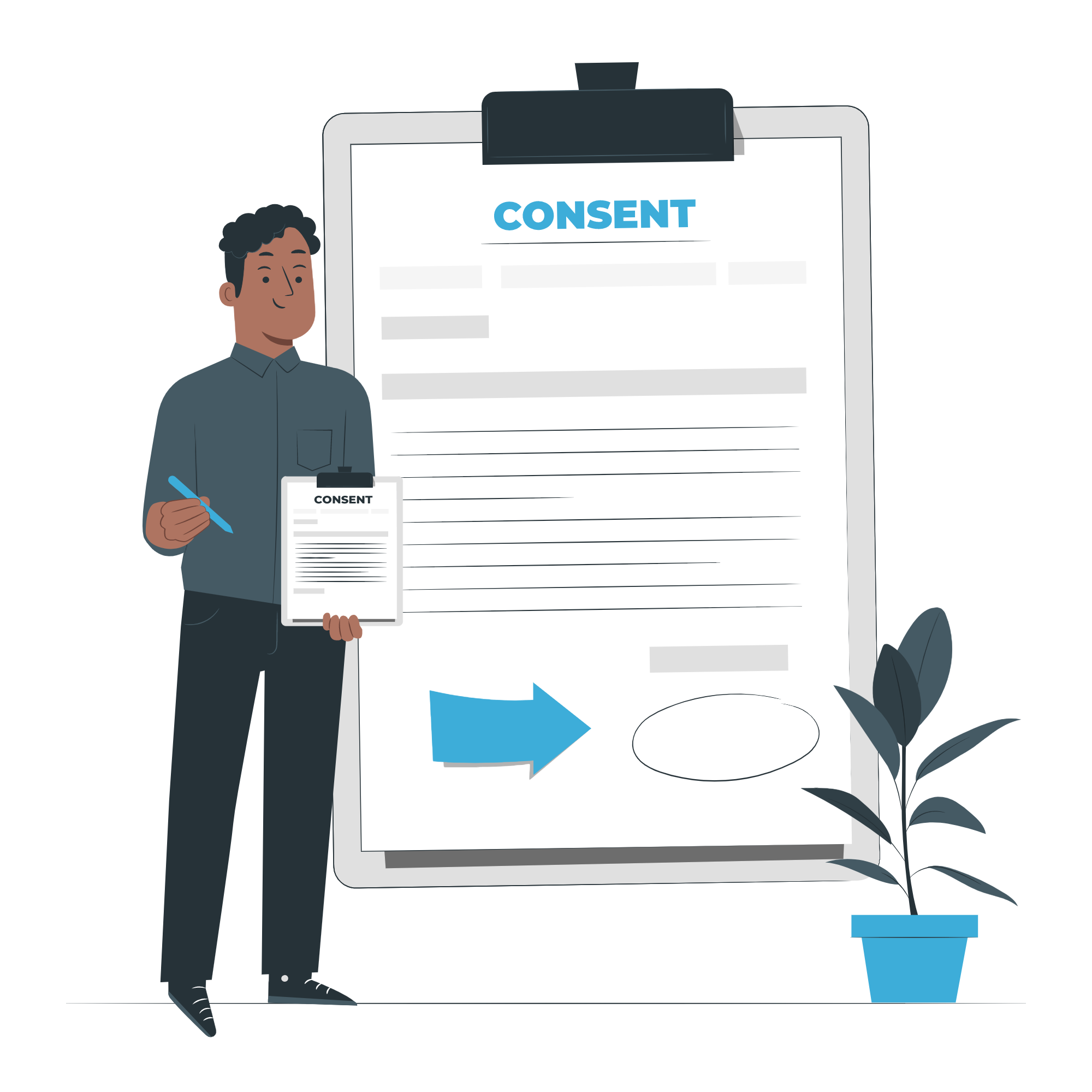Resources for Caregivers
Obtaining and Providing Mental Health Information
This guide is designed to help family members and others who fill a family-like role to receive information from healthcare professionals, and to more effectively give information to mental healthcare professionals. As a family member, you have a first hand glimpse into the everyday life of your loved one. This vital information is important for the continuity of care, recovery, and ongoing support of your loved one suffering from a mental illness.


Confidentiality & Care
The Freedom of Information and Privacy Act require that doctors, nurses, and other clinicians keep everything a patient tells them confidential except:
- Where the patient gives consent to release information
- Where the law allows or requires information sharing with others even if the person does not consent.
The Freedom of Information and Protection of Privacy Act, which applies to Regional Health Authorities, is interpreted to mean that:
“public bodies may release necessary personal information to third parties without the consent of the client where disclosure is required for continuity of care or for compelling reasons if someone’s health or safety is at risk” (see page 119 of Guide to the Mental Health Act)
Obtaining Relevant Information from a Clinician
The reality of privacy is important, and is often viewed as a barrier by caregivers. There is one common thread from the countless case managers, psychiatrists, and other clinicians we’ve spoken to: they understand. They are deeply empathetic to the reality of caregivers, and share your concern for your loved one. They are also tied by the Privacy Act on the information that they can share.
There are two primary ways you can work with a clinician and your loved one to obtain consent for access:
- Have your loved one sign a release that can be given to the clinician allowing the sharing of information you as a family member. This release cannot be signed under any form of coercion, and release is still at the discretion of the clinician.
- If the person does not consent, by providing clinicians with information so that they can use provisions in the Freedom of Information and Protection of Privacy Act (FIPPA) or the Personal Information Protection Act (in private practice) to justify information sharing without consent.
The decision to release information solely rests with the clinician. Such decisions—consented to or not—can be facilitated by families, who often know the ill person and their circumstances well.
You are always welcome, and invited, to share information with the clinician. They cannot acknowledge what they do or do not know, but they do take family information under consideration as they care for your loved one.
This guide applies to community and inpatient services and includes people under the Mental Health Act.

Working Towards Consent
Through the Clinician
The first step towards obtaining consent is identifying yourself as an indvidual caring for your ill loved one, and that you need relevant information necessary for their continuity of care. Keeping the scope of the conversation to information only necessary to their care is vital.
You can suggest that the clinician seek consent from the ill individual and have that consent kept on the patient’s file. This allows other staff and clinicians to also share information with you moving forward.
It may be helpful to ask the clinician their process for obtaining consent from patients. You know how your loved one will respond best, and if the approach seems realistic for your loved one no further conversation is needed. If, however, the clinician does not have a concrete plan, you may suggest a course of action like:
“For me and the people who work with me to be able to do our job to help you, we sometimes need to share information with or get information from others who care about you – for example, your mother, and other members of your support group. This does not include information about your personal life, but only things useful for your recovery. I assume that’s ok?”
If your loved one gives a positive repsonse, this represents consent and the clinician can note that on the file. Unless there is evidence to the contrary, the clinician assumes your loved one is capable of consenting. Consent must be given freely and not obtained by coercion or threat.
Even if the clinician does not have a process for consent, or your loved one does not consent in this situation, do not lose hope. A consent form may be useful.
Obtaining Written Consent
You can download the consent form used by Island Health above. Your loved one (and any legal guardian, if applicable) will need to sign the form and take it to their clinician. If the consent is only verbal, the form will need to be signed by two witnesses not named on the form itself. The form is evidence of consent when signed when the individual was capable, and carries over to when the individual is incapable. Capable individuals can withdraw consent at any time.
A valid Release of Information form should be adequate for release of relevant information. If there are additional barriers, or you anticipate future problems, you can pursue a formal Representation Agreement.
Representation Agreements
These agreements are a powerful legal tool, as defined by the Representation Agreement Act. When an individual is capable of understanding, they can enter into an agreement for another individual (usually a relative, but any adult is valid) to represent them and make decisions on their behalf if they become incapable.
Instructions can be left for an individual to give and receive mental health information and make health-related judgements should you become incapable or deemed to be in psychosis. The Representation Agreement becomes active when someone is deemed incapable, but is also evidence of consent to release information in other times.

My Loved One Won’t Consent
Don’t lose hope. Understand that your loved one has their own autonomy and is free to make this choice, as frustrating as it might be.
You can continue to gently dialogue with your loved one, explaining the benefits of consent with your loved one. It is helpful to note that personal or intimate details are not your business, and that you neither want that information, nor can the clinician share that confidential information.
If your loved one consented when they were capable, but are no longer able capable, such as under psychosis, that evidence should be acceptable to the clinician even if the loved one currently refuses. Evidence includes a previously completed consent form, or statements the individual has made previously.
If you have a Representative Agreement, it becomes effective when your loved one is no longer capable of making a decision. Information can be released to the individual named in the Agreement on the authority of the Representative Agreement.
Even if consent is not available verbally, through a consent form, a Representative Agreement, or other evidence, the Freedom of Information and Protection of Privacy Act (FIPPA) allows for a clinician to release information despite the ill person’s objection under particular conditions. This section from the Guide to the Mental Health Act from page 120 is relevant:
“If a client’s personal information was collected for health care purposes, public bodies [hospitals, regional health authority clinics, etc.] may release necessary information to third parties for “continuity of care”. This means public bodies may disclose personal information to healthcare professionals, family members, or to other persons, such as friends and relatives, involved in a client’s care for the purposes of that care. The release of the information must be in the best interests of the health of the client.”
You can find more detail and examples in the Guide to the Mental Health Act, Appendix 13. This provides concrete examples of how clinicians can share important information with families despite the absence of consent. It may be beneficial to provide them with a copy.
It is important to let the clinician know the reasons why receiving the information is necessary for the continuity of care for the loved one, and/or how it will mitigate risks to the health and safety of the ill individual or others.
The Mental Health Act and Release of Information
When an individual is an involuntary patient as classified by the Mental Health Act, the clinicians are required to inform a near relative of the following:
- The admission
- The patient’s right to Renewal Certificate examinations
- The right of a second medical opinion on the appropriateness of the patient’s treatment
- The right to apply to the Review Panel and court
These applications can be made by the patient, the relative, or anyone else on behalf of the patient. Additionally, near relatives must be notified if the person applies to the Review Panel and when the patient is discharged from involuntary status, including from extended leave.
If the near relative does not receive these notifications or requires more information about forms, they should contact the patient’s nurse, social worker, physician or psychiatric unit director. This ‘near relative’ selected by the patient can be soimeone other than the nearest blood relative.
Valid Reasons for Withholding Information
Clinicians may choose to not release information, even in the presence of consent. Valid reasons include:
- Endangerouing the health or safety of the patient, or another person
- The information names other people (written forms can be redacted)
- The information has been provided in confidence by another individual
If a clinician is refusing to release information, despite consent, you are free to ask under which provisions of the Freedom of Information and Proection of Privacy Act they are refusing.
If Information is Not Release by the Clinician
While a clinician may be reluctant to provide specific patient information, they may feel more comfortable talking about a hypothetical situation. For example, a son may have refused consent to talk to his mother about prognosis, the clinician may still share:
If they refuse their medication, about X% of individuals with the kind of schizophrenia your son has are likely to relapse within a year.
If a clinician is unwilling to discuss the matter, you may ask to speak to the clinician’s manager. Even when the management chain is not successful, there is a formalized complain process through the Patient Care Quality Office with both Island Health and Provincial Health Services Authority. If you continue to find the issue unresolved, you can make an appeal to the Patient Care Quality Review Board.
Assistance at any stage is available through your local mental health administration, mood disorder, or mental illness advocacy organization. You can also approach the College of the profession of the clinician withholding information, as can the Ombudsman.
Providing Information to Clinicians
As someone close to your loved one, you have valuable information that would be helpful to clinicians. Examples would include noticeable improvement or worsening symptoms, side effects, new symptoms, not following a treatment plan, etc.
You are always welcome to provide information to the clinicians about the state of your loved one. The clinician may not be able to acknowledge any further information, but they do record and take that information into account when offering care to your loved one.

Remember to Care for Clinicians
Often we find ourselves in moments of crisis, or in the valley of worsening symptoms and we are looking for immediate answers, it can be easy to be less than our ideal selves. In all conversations with your clinicians, take care to speak with respect, and understand that often the clinicians hands are tied in what they can say.
We work alongside many wonderful people in the Mental Health system, and they care deeply for your loved one — and for you in this journey.
